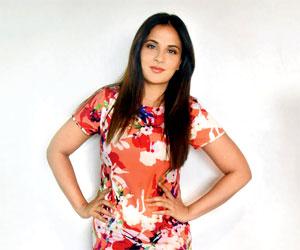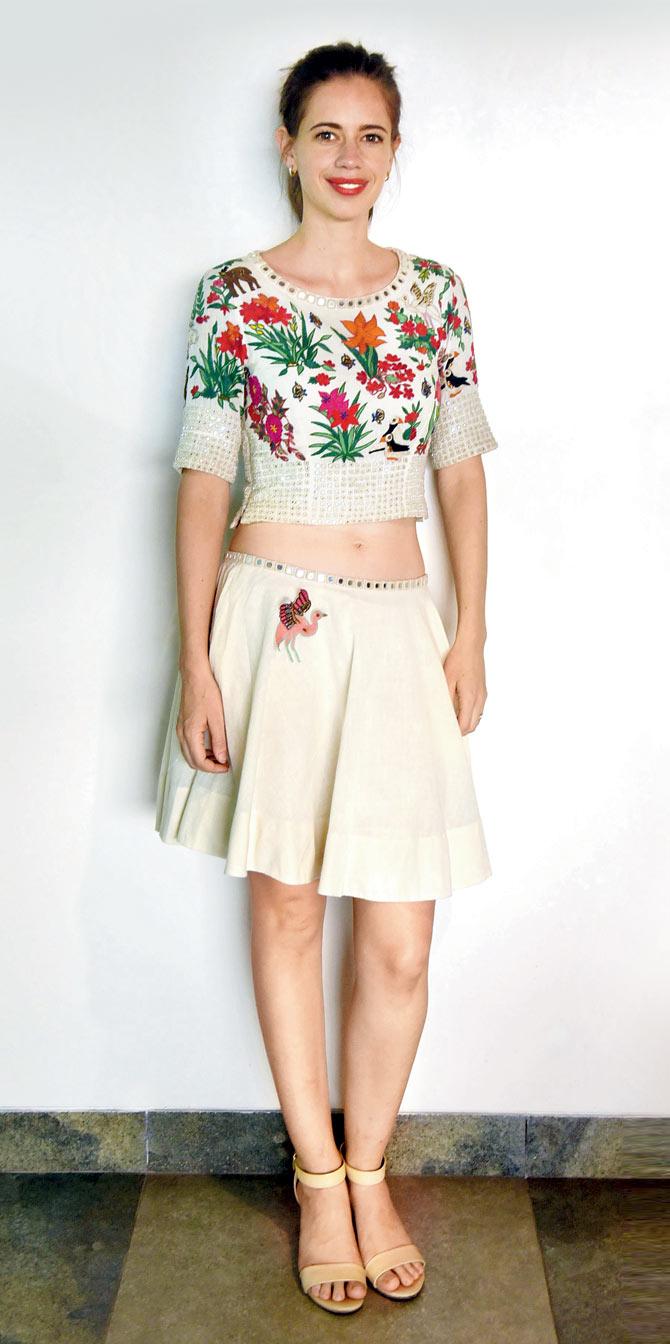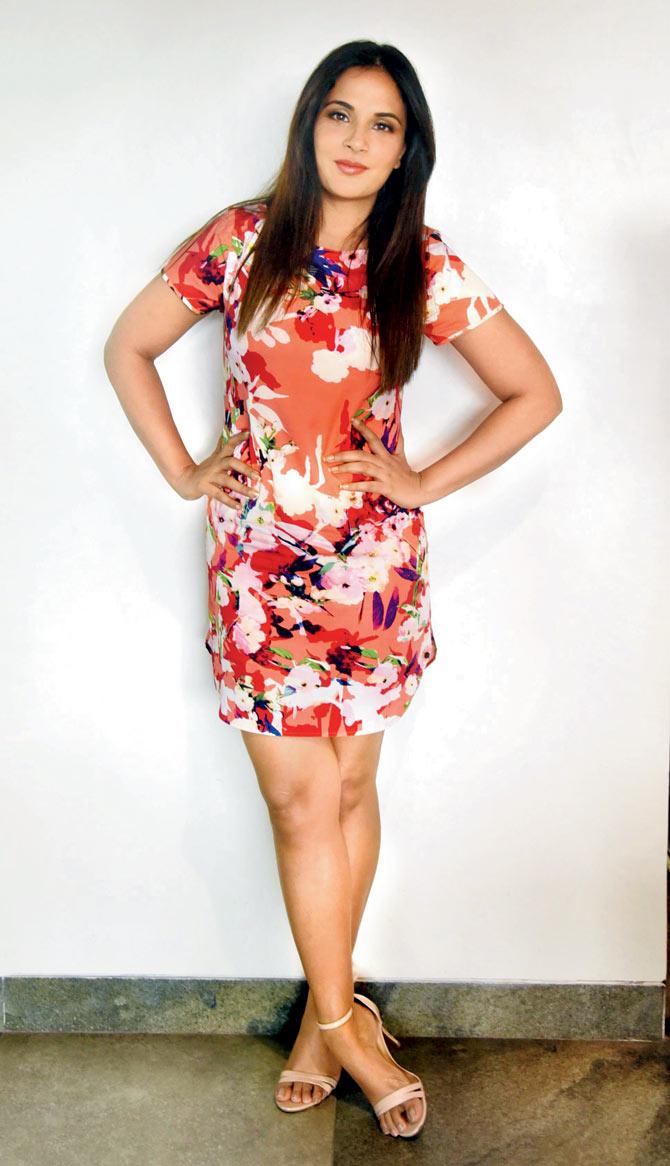Ahead of the release of their road trip film Jia Aur Jia, Richa Chadha and Kalki Koechlin talk about how viewers and the industry stereotype women

A glimpse of the ebullient characters they play in their forthcoming film is made visible when Richa Chadha and Kalki Koechlin cheer with joy when we enter a room to conduct this interview. But, the enthusiasm has nothing to do with us, more with the generous packets of food that follow us. A harmless argument over a fish and a chicken dish ensues — Chadha, we're told, doesn't eat chicken — as the actors finally decide to dig into an associate's 'ghar ka dabba' instead. Chadha graciously thanks its owner, as Koechlin brushes away crumbles on the table. "Cleanliness is an obsession," she reasons sheepishly, stealing a glance at her co-actor.
ADVERTISEMENT

Kalki Koechlin
That the duo shares an affable relationship is evident, essential even, given that they're set to bring forth, as Koechlin says, Bollywood's "first female road trip film". At first glance, the vivid Jia Aur Jia, that sees the duo escape to Sydney, seems like a trip one would love to take with close pals, but Chadha warns that all is not happy. "If you see my character, you'll notice there's a pain that bothers her, and that was the challenge to pull off," she says while tackling questions on how her role is far distanced from the garrulous ones she's been famed for. For Chadha, an 'image' isn't one that an actor consciously crafts. It is a label that the audience puts on him/her, as per their choices. She narrates the chronology of her releases to further her point. "I got an offer for Ram-Leela (2013) before Gangs of Wasseypur (2012), and, the characters I play in the two films are at odds. But, because Gangs released first, I, as an actor, was attached to that character because the audience enjoyed it."

Richa Chadha
The fervent desire to templatise elements, says Chadha, isn't a tendency of the audience alone. "Our industry also stereotypes women. If she must be shown as a sati-savitri, they'll show as a staunch opponent of indulging in sex before marriage. If they have to show her as a liberal woman, they'll place a cigarette in one of her hands, and a glass of alcohol in another. Why? Do we have to be either one of the two extremes? Is there no middle-ground? We can be neither of the two, or both." The discussion invariably moves towards the onus on writers to define such characters. Chronicling her love for the nitty gritties kept in mind while chalking out Ranbir Kapoor's role in Ae Dil Hai Mushkil, she says "nuance" is the key to creating authentic characters.
A believable character, Koechlin jumps in, is an essential for her too. "If you don't believe the character, you can't play it. And if you feel things are disconnected, you must address your concern with the director. You may feel that connect instantly, or after a while. For instance, I took long to give a nod to Ribbon [drama that pairs her with Sumeet Vyas]. But, when Margarita With A Straw came my way, I instantly loved it."
Yet, they are unwilling to part with their craft easily. Should they find scope in the roles coming their way, the duo will not shy away from incorporating those details themselves. "I learnt this on my first film," says Chadha, alluding to the 2008 comedy, Oye Lucky! Lucky Oye! "I was given a character who was brash. She danced at weddings. So, when I read the script to find a few dialogues in English, I asked the makers why a girl like her would be well-versed in the language. We eventually amended the character to be someone who spoke broken English, like lower middle-class women would. There was the line, 'Don't you find me hot', which we tweaked to, 'Kya main thuje hot nahi lagti?' And eventually, I arrived at that peculiar pronunciation of 'hot' that was used in the film. It became iconic." An inference to Jia Aur Jia is also drawn when Koechlin adds to Chadha's arguments. "I wear a cast in a few scenes. While it never occurred to us initially, we realised that a person with an injured arm will eat differently, or will need help pulling on a jacket. So, we improvised there."
Chadha, however, is quick to point out that the folly isn't on the part of writers alone. Bringing to light a working atmosphere that she says is less favourable for them, the actor highlights how writers may be roped in for a project that may be deferred by years, but are kept from working on other films in the meanwhile. "How is he supposed to pay his bill then? Mumbai is so expensive that when unemployed, people struggle to manage essentials, like water, light and food, forget affording amenities. Had I not come from an upper middle-class family, I wouldn't survive in Mumbai. So, should we ignore an entire group of people, in this case, the writers, who may have talent, but can't afford the city because of our irrational working terms? Producers should pay them a retainer-ship until the film kicks off."
A discussion with two female actors set to release a women-oriented film is certain to draw attention to the plight of women in the industry. Koechlin highlights that while gender equality is a topic that's being discussed , it will take a while for society to come to terms with women in the workforce. "The workforce is dominated by people who have grown up in an environment that's different from how it is today. They've seen their mothers stay at home as their fathers went to office to earn. So, while they understand the importance of equality, that's not what they've seen while being raised. It will take an entire generation to undo that."
 Subscribe today by clicking the link and stay updated with the latest news!" Click here!
Subscribe today by clicking the link and stay updated with the latest news!" Click here!






